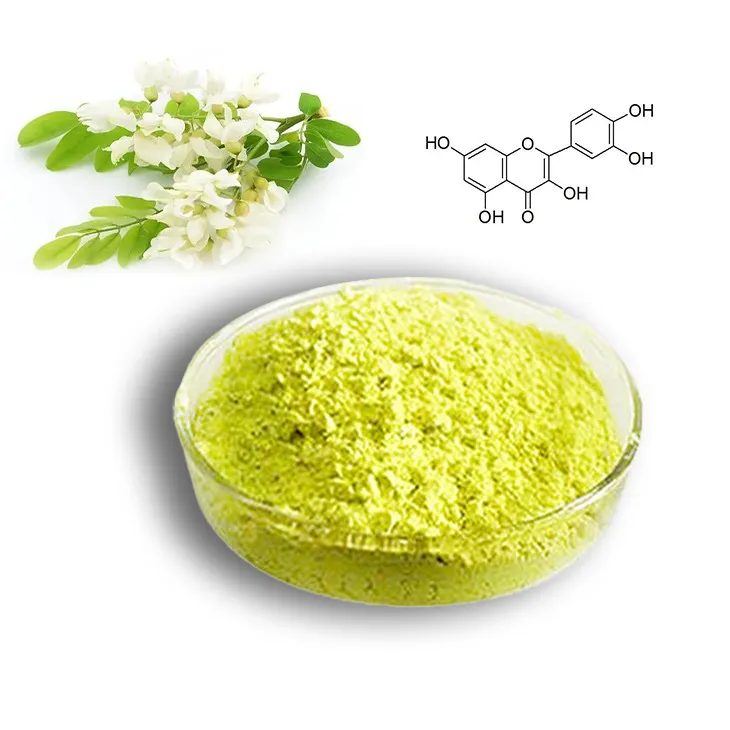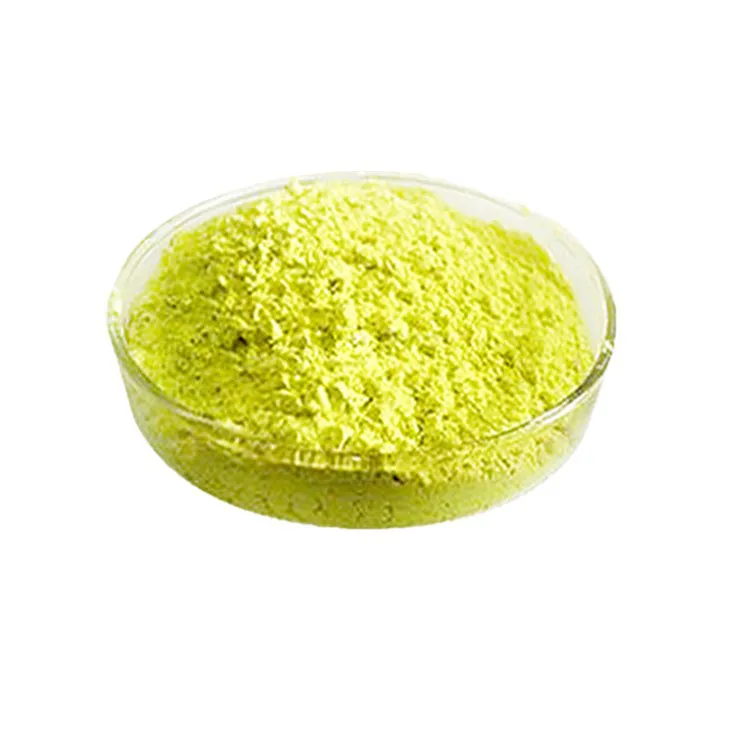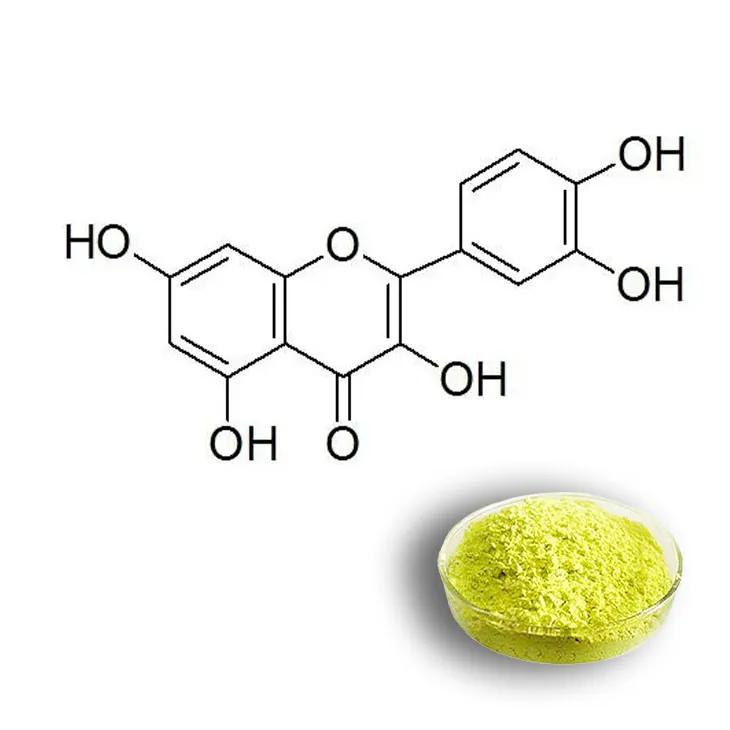- 0086-571-85302990
- sales@greenskybio.com
The Benefits of Quercetin: An Impressive Extract on the Kitchen Table.
2024-11-14

Introduction
Quercetin is a remarkable substance that is often overlooked despite being present in many common foods on our kitchen tables. It is a flavonoid, a type of natural compound found in plants, which has been the subject of extensive scientific research in recent years. This natural extract offers a wide range of health benefits, making it an important component of a healthy diet.

Antioxidant Properties
Quercetin is well - known for its antioxidant properties. In the body, cells are constantly exposed to various sources of oxidative stress, such as free radicals. Free radicals are unstable molecules that can damage cells, DNA, and proteins. This damage can lead to a variety of health problems, including aging, cancer, and heart disease.
Antioxidants like Quercetin work by neutralizing free radicals. They donate an electron to the free radical, making it stable and preventing it from causing further damage. This process helps to protect the body's cells from oxidative damage, reducing the risk of developing various diseases. Studies have shown that quercetin has a high antioxidant capacity, comparable to other well - known antioxidants such as vitamin C and vitamin E.

Heart Health Benefits
Lowering Blood Pressure
One of the significant benefits of quercetin for heart health is its potential to help lower blood pressure. High blood pressure is a major risk factor for heart disease, stroke, and other cardiovascular problems.
Quercetin may exert its blood - pressure - lowering effect through several mechanisms. It can relax the blood vessels, allowing blood to flow more easily. This relaxation is achieved by inhibiting certain enzymes and signaling pathways in the blood vessel walls that cause constriction. Additionally, quercetin may also reduce the production of angiotensin - II, a hormone that can raise blood pressure.
Reducing Cholesterol Levels
Quercetin also has the potential to reduce cholesterol levels. High levels of cholesterol, particularly low - density lipoprotein (LDL) cholesterol, are associated with an increased risk of heart disease.
Quercetin can interfere with the absorption of cholesterol in the intestines. It may also increase the breakdown and excretion of cholesterol from the body. By reducing cholesterol levels, quercetin helps to keep the arteries clean and free from plaque buildup, which can lead to heart attacks and strokes.

Anti - Inflammatory Effects
Quercetin has powerful anti - inflammatory effects. Inflammation is a natural response of the body to injury or infection, but chronic inflammation can contribute to a variety of diseases, such as arthritis, diabetes, and certain cancers.
Quercetin works by inhibiting the production of inflammatory mediators, such as cytokines and prostaglandins. These molecules are responsible for triggering and maintaining the inflammatory response. By reducing their production, quercetin can help to alleviate inflammation and its associated symptoms. For example, in patients with rheumatoid arthritis, quercetin may reduce joint pain and swelling.

Immune System Boost
Another important benefit of quercetin is its ability to boost the immune system. A strong immune system is essential for protecting the body from infections and diseases.
Quercetin can enhance the function of immune cells, such as white blood cells. It can stimulate the production of antibodies, which are proteins that help the body recognize and fight off foreign invaders. Additionally, quercetin may also have antiviral properties, helping the body to combat viral infections more effectively.
Food Sources of Quercetin
Quercetin is found in a variety of foods, making it easily accessible in our daily diet. Some of the rich sources of quercetin include:
- Onions: Both red and yellow onions are high in quercetin. The outer layers of the onion contain the highest concentration of this flavonoid.
- Apples: Especially the skin of apples is a good source of quercetin. Apples are not only delicious but also a healthy addition to the diet due to their quercetin content.
- Berries: Such as blueberries, strawberries, and raspberries. These colorful berries are rich in antioxidants, including quercetin.
- Green tea: It contains a significant amount of quercetin along with other beneficial compounds. Drinking green tea regularly can provide a good dose of this flavonoid.
Supplementation and Precautions
While quercetin can be obtained from food sources, some people may choose to take quercetin supplements for additional health benefits. However, it is important to take certain precautions when using supplements.
Dosage
The appropriate dosage of quercetin can vary depending on the individual's health condition and goals. It is advisable to consult a healthcare professional before starting quercetin supplementation. In general, recommended dosages range from 500 - 1000 mg per day for adults.
Potential Side Effects
Quercetin supplements are generally considered safe for most people when taken in appropriate doses. However, some people may experience mild side effects, such as stomach upset, headache, or dizziness. If these side effects occur, it is recommended to stop taking the supplement and consult a doctor.
Interactions with Medications
Quercetin may interact with certain medications. For example, it can interact with blood - thinning medications, increasing the risk of bleeding. It may also interact with some antibiotics and antihypertensive drugs. Therefore, it is crucial to inform your healthcare provider if you are taking any medications before starting quercetin supplementation.
Conclusion
Quercetin is a remarkable natural extract with a wide range of health benefits. Its antioxidant, heart - health - promoting, anti - inflammatory, and immune - boosting properties make it an important component of a healthy lifestyle. While it can be obtained from a variety of foods, those who may benefit from higher doses may consider supplementation under the guidance of a healthcare professional. However, it is essential to be aware of the potential side effects and interactions with medications. Overall, incorporating quercetin - rich foods into the diet or considering supplementation can be a valuable step towards maintaining good health.
FAQ:
What is quercetin?
Quercetin is a flavonoid which is an impressive extract that can be found on our kitchen tables. It has antioxidant properties and offers a variety of health benefits.
How does quercetin support heart health?
Quercetin may support heart health by helping to lower blood pressure and reduce cholesterol levels.
What are the anti - inflammatory effects of quercetin?
Quercetin has anti - inflammatory effects and may potentially alleviate symptoms in various inflammatory conditions.
How does quercetin boost the immune system?
Quercetin shows promise in boosting the immune system, which enables the body to better fend off diseases, though the exact mechanisms are still being studied.
Can quercetin be easily obtained?
Yes, quercetin is an extract that can be found on our kitchen tables, which implies it can be obtained relatively easily, perhaps from certain foods.
Related literature
- The Role of Quercetin in Health and Disease"
- "Quercetin: A Promising Natural Compound for Health Promotion"
- "Quercetin and Its Impact on Oxidative Stress and Inflammation"
- ▶ Hesperidin
- ▶ Citrus Bioflavonoids
- ▶ Plant Extract
- ▶ lycopene
- ▶ Diosmin
- ▶ Grape seed extract
- ▶ Sea buckthorn Juice Powder
- ▶ Fruit Juice Powder
- ▶ Hops Extract
- ▶ Artichoke Extract
- ▶ Mushroom extract
- ▶ Astaxanthin
- ▶ Green Tea Extract
- ▶ Curcumin
- ▶ Horse Chestnut Extract
- ▶ Other Product
- ▶ Boswellia Serrata Extract
- ▶ Resveratrol
- ▶ Marigold Extract
- ▶ Grape Leaf Extract
- ▶ New Product
- ▶ Aminolevulinic acid
- ▶ Cranberry Extract
- ▶ Red Yeast Rice
- ▶ Red Wine Extract
-
Bilberry Extract
2024-11-14
-
Moringa powder
2024-11-14
-
Honeysuckle Pollen
2024-11-14
-
Nettle Root Extract
2024-11-14
-
Shikone Extract
2024-11-14
-
Chasteberry Extract
2024-11-14
-
Black Garlic Extract
2024-11-14
-
Clove Powder
2024-11-14
-
Licorice Root Extract Powder
2024-11-14
-
Reishi mushroom extract
2024-11-14





















